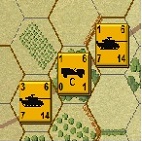CapnDarwin
Posts: 8467
Joined: 2/12/2005
From: Newark, OH
Status: offline

|
To get back on topic, here is my summary of this state of wargaming: 30 years later and we still sit in front of a screen, keyboard, and mouse. Yes, the screens are bigger, and the resolution is greater and some screens look like surfboards. The only real change over this time is what goes on under the cover of the PC. Faster CPUs, bigger GPUs, more RAM, and massive storage space. Plus, this little thing called the internet. While people seem to yearn for this mystical change in how to game, the reality is there are no new means to do the basic functions of input and output. Barring plugging a chip into our brains to think to the computer, that will come someday, we are locked into the same methods of information flow. The same menu/toolbar, right-click, and left-click mechanics used over 30 years still work today and the mechanics and conventions are well known. People see that and go, "hey the 90s called and they want their UI back", but everyone who used a windows PC is not confused about how that UI works. If I make you suddenly have to make clover-leak mouse gestures while tapping the space bar with your nose to open a dialog or do a movement on a map, while innovative, it is damn stupid and most gamers who never read manuals won't understand how to play the game or even start it. I have refunded or uninstalled a few games for this type of "innovative" UI issue.
What has innovated in the past three decades is what most players never see. What goes on in the code. What we have gained in the past 30 years is the means to constantly reduce the level of abstraction required to perform many of the calculations covering everything from movement to spotting/LOS to combat. What was once a simple formula and a die roll or two can now be a more detailed and realistic calculation based on many different factors that weigh on the outcome of events. Even with all this newfound computing capability, one area lagging in most games is the AI. Partly that is the fault of deeming early weighted if-then trees and die rolls as being "AI", when in fact we are still slowly getting to a technology point where home PCs can truly have a running game AI. Here again, we have a very major abstraction of a "human" mindset. Most games lean on the weighted die rolls and complex if-then logic. Some innovative games try to better mimic more advanced processes to achieve a "smart" answer to a game situation. The best means of having a true AI game is playing another human. As the horsepower of computers continues to grow, better implementations of AI will rise and the abstraction of thought and even memory of events will improve in the games we play.
So, sit back and enjoy the ride. 
_____________________________
OTS is looking forward to Southern Storm getting released!
Cap'n Darwin aka Jim Snyder
On Target Simulations LLC
|
 Printable Version
Printable Version



















 New Messages
New Messages No New Messages
No New Messages Hot Topic w/ New Messages
Hot Topic w/ New Messages Hot Topic w/o New Messages
Hot Topic w/o New Messages Locked w/ New Messages
Locked w/ New Messages Locked w/o New Messages
Locked w/o New Messages Post New Thread
Post New Thread